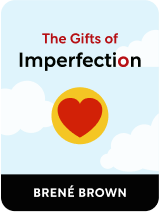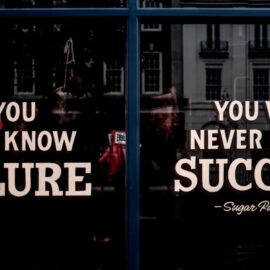

This article is an excerpt from the Shortform book guide to "The Gifts of Imperfection" by Brené Brown. Shortform has the world's best summaries and analyses of books you should be reading.
Like this article? Sign up for a free trial here .
What does it mean to live authentically? Why is vulnerability a large part of authentic living? What are some common barriers to authentic living?
In her book The Gifts of Imperfection, Brené Brown says that the first step in living Wholeheartedly is to practice living authentically. However, this can be difficult when society’s expectations don’t line up with your authentic self.
Here’s Brené Brown’s advice on how to live authentically in a judgemental world.
How to Be Authentic
Brown’s first strategy for living Wholeheartedly by being yourself is being authentic. But what does it mean to practice authentic living?
According to Brown, authenticity is a way of thinking and acting: It’s actively making the decision to show your true self to the world. This means all of your true self, including the more vulnerable parts—for example, your fears, your imperfections, and your quirks.
| Accepting All of Your Authentic Self Note that to follow Brown’s advice and show even your most vulnerable parts to the world, you’ll need to learn to accept those vulnerabilities. If you see your fears, flaws, and quirks as things to be ashamed of, you’re going to try to hide these parts of yourself. This is incompatible with authenticity. The idea of accepting your flaws and vulnerabilities may feel alien. As Tara Brach notes in her book Radical Acceptance, Western society teaches us that to be worthy of love and praise, we need to “fix” our flaws and vulnerable parts—not accept and show them. However, learning to accept your vulnerabilities is important because it increases your feeling of worthiness. You’ll stop seeing your flaws as evidence you’re “not good enough,” and you’ll instead be able to fully embrace your true self. One possible path to accepting your flaws and vulnerabilities is to recognize them as important and inevitable parts of existence. As Brach notes, we’re all imperfect. Having flaws and vulnerabilities doesn’t mean that there’s something “wrong” with you—just that you’re human, like everyone else. Why waste your energy trying to hide key elements of your humanity that are ultimately nothing to be ashamed of? We’ll discuss the idea of accepting your imperfections further in the next chapter, when we explore perfectionism and the harm it can do to Wholehearted Living. |
Barriers to Living Authentically
Brown acknowledges that being authentic takes a lot of courage. Letting the world see who you truly are can be a scary process, not least because, as Brown explains, the process often throws up two major barriers:
Barrier #1: The fear of resistance from your loved ones. Choosing to live authentically requires you to change your behavior: specifically, to stop hiding parts of yourself and curb any inauthentic behaviors. Brown explains that you may fear that your loved ones won’t accept this new, authentic you, and that this will damage your connections with them. She also highlights that unfortunately, this may happen: Some people do react badly to change, even if this change is a necessary part of a loved one living healthily and authentically.
| Authenticity Benefits Relationships If your loved ones were to react to your newfound authenticity in a negative way, you could respond by reassuring them that your move to authenticity isn’t something to fear: It’ll benefit them, as well as you. For example, as Joshua Fields Millburn and Ryan Nicodemus argue in their book Minimalism, when a loved one is authentic, we feel more safe and secure in our relationship with them because we know we’re seeing—and love—their true self, not a false front. Your loved ones could experience this added security, were they to overcome their fear of change. |
Barrier #2: The fear of challenging societal expectations. Brown notes that society demands we conform to certain norms—that we look, act, and think in a certain way. If your true, authentic self doesn’t match up to society’s expectations, you may be afraid to be yourself. What if people reject, criticize, or shame you for failing to conform? The fear of this happening isn’t totally unfounded: Brown points out that societal expectations are so deeply ingrained in our culture that people do often ridicule or shame those who fail to meet them.
| Pushing Back Against Societal Pressure The pull to conform to social norms can be strong. As Brown notes, we often fear the pushback and rejection that can result from breaking convention. However, this is a fear we must overcome if we want to live as our true, authentic selves. So, how can we resist the pressure to fit societal expectations? Many authors have attempted to answer this question. For instance, in his book Influence, Robert B. Cialdini suggests that you can fight the instinct to conform by critically analyzing the behavior that society is trying to push you to adopt. Ask yourself, will this behavior benefit me in any way other than helping me to conform? If you find that it won’t, you may feel more comfortable rejecting the behavior and acting in the way you want to instead. (Brown also highlights the importance of critically analyzing societal messages when discussing building resilience, a topic we’ll explore in the next chapter.) Furthermore, in Flow, Mihaly Csikszentmihalyi suggests that parents can specifically encourage teens not to conform to societal and peer pressure by showing unconditional acceptance to their children: non-conformist traits and all. If teens receive this approval from their parents, they’ll be less likely to seek it from their peers and thus less likely to conform to peer pressure. Presumably, if we raise self-accepting, authentic teens, they’ll grow into self-accepting, authentic adults. |
Overcoming These Barriers
Brown suggests that to overcome these fears of rejection and pushback, first, acknowledge that embracing authenticity isn’t always the safe option when it comes to pleasing others. However, also accept that the negative consequences of living inauthentically are much more severe than the criticism you may face for being authentic.
According to Brown, inauthenticity chips away at your worthiness and may impact your overall mental wellbeing: She argues that it can lead to depression, anxiety, and numerous other mental struggles. Furthermore, inauthenticity is a rejection of self-acceptance and self-love. Deciding that your true self needs to remain hidden reinforces the idea that you’re fundamentally not good enough.
| The Benefits of Authenticity Research supports Brown’s assertion that being inauthentic is harmful to your mental health and worthiness—and, by extension, that being authentic benefits your mental health and worthiness. One study found that living authentically leads to greater general life satisfaction as well as increased wellbeing. Another linked living authentically to having high self-esteem—or as Brown would call it, worthiness. Authenticity might also bolster your career prospects. Some authors argue that if you work in business or sales, being authentic may be the difference between success and failure. For instance, in his book Start With Why, Simon Sinek argues that being an authentic and honest salesperson, rather than an off-putting, manipulative one, will help you to build long-lasting relationships with customers and become more trustworthy. |

———End of Preview———
Like what you just read? Read the rest of the world's best book summary and analysis of Brené Brown's "The Gifts of Imperfection" at Shortform .
Here's what you'll find in our full The Gifts of Imperfection summary :
- How to stop feeling like you're not "good enough"
- How shame affects your self-worth
- The 10 guideposts to living Wholeheartedly and cultivating worthiness






